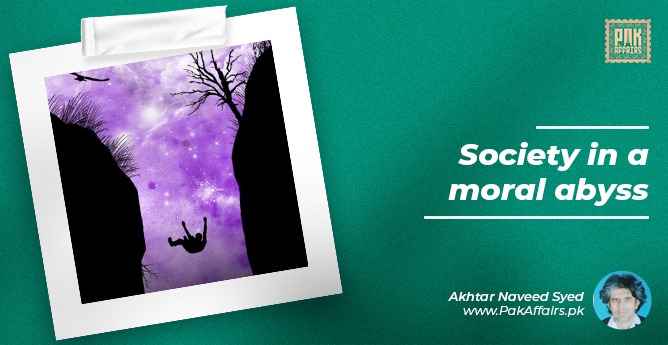
Reason to exist is time and again questioned in societies devoid of a moral compass. This sense of behavioural direction is questionably based on a dogma, which provides a guideline. So, is the consciousness of knowing red lines an inherent property of the human psyche or needs a recipe which humanity cannot come up with?
Do basic facets of life like taking care of others, being selfless, accepting other peoples’ views based on reason instead of face value, and being open to individualistic lifestyles require red lines to be acceptable. It seems the lines are full of darkness as certain ideas are imposed without being based on reason. Such manoeuvring is seen as a virtue by groups, which claim to be on the right side of history in any society globally.
The patterns of life, which can be examined under this magnifying glass include corruption, extortion, kidnappings, uncleanliness, tendency to cheat others, and the like along with models of governance. Human societies have allegedly had supernatural interventions to straighten the compass. However, a question arises whether this comes as a subjective notion or at the genetic level.
Taking the latter into consideration and viewing global societies closely one can divide nations/groupings into specific mindsets. Those with tightly shut societies seem inclined towards enforcement of ideologies while at the same time being deeply rooted in mental corruption. Those with open mindsets are sparing, in effect, practising real live-and-let-live. Most of those, which claim to be open are deeply involved in mind games, duplicity, and hypocrisy.
Evolutionary patterns and mammalian hierarchies point to a genetic basis of morality. For animals, these red lines are simple and not innate. Innateness is akin to fate, which is highly likely to be untrue for humans as well as animals. Animals never rape but humans do. For animals, sexual behaviour is only linked to procreation whereas for mankind this also serves as a weapon to enforce red lines. These boundaries at times of heightened ideological differences are ignored as evidenced during times of war.
Social patterns in different countries can be characterized in terms of the previously mentioned points. Ideologies tend to close societies by increasing prejudices and creating divisions. States, which profess these seem to be highly insecure and enforce policies that negate pluralism, diversity, individualism, and work on narratives that have no basis to prop up functional societies.
Nations, which have a predisposed tendency to look up to a masculine central figure, tend to be authoritarian, take writings and speeches at the face value and try to build walls to replace erasable lines. At the other end of the governance is an openness to accept individuals of either gender as a central authority. However, this does not create a society drowning in openness, open to all types of expressions and lifestyles of individuals.
Governance is an enigma as groupings within a nation have their own lines and walls, dogmas and genes, and willingness to accept reason as a basis of negotiation. This mystery is subject to a collective moral consciousness that is tweaked by people-to-people exchanges. This collective state of the groups is put to test in countries that espouse democratic processes.
The elections that take place produce sets of ideas, which may be imposable, acceptable, or negatable. Such outcomes are only possible when clear sets of an electorate are espousing those discrete memes. Such regimes include those of Trump’s US, Duterte’s the Philippines, Orban’s Hungary, including others. Their electability is based on ideas of morality in the form of memes, which currently are illiberal, protectionist, and nationalistic due to explainable experiences within those societies.
The red lines tend to lose their capacity to act as a compass when democracies have a higher power to establish differentiable memes. Such actions are clearly observable in regimes currently ruling the roost in Israel along with scores of others.
In certain states, memes do not exist, but red lines are clearly visible. These represent democratic autocracies like Russia, Central Asian states along with a multitude of African countries and those in West Asia. Here, groups trying to form their own identities are forced to remain underground and unrepresented.
The state of this compass in our own country beckons us to ponder what can an idea do. The thoughts that may ensue could form memes to break walls and red lines created by those with questionable collective moralities. Memes that might be created may remain underground to convert walls into fortresses or become viral to evolve into an elixir of desirable governance.
The writer is a freelance journalist based in Islamabad
Email: [email protected]



